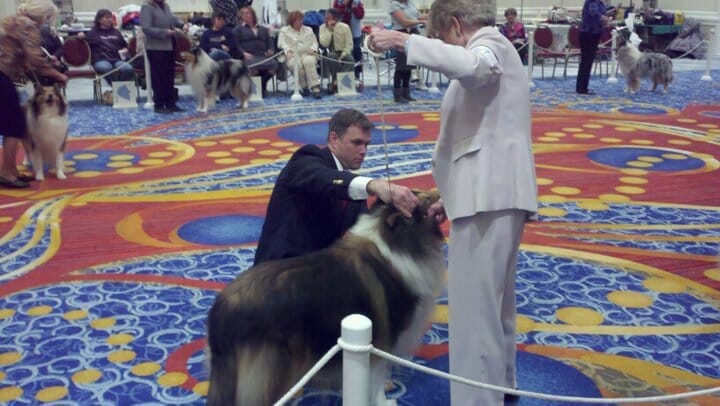
A Letter of Admonition to Collie Specialty Clubs
Dog shows are the highlight of every specialty club’s calendar. The members plan, organize, and volunteer their time to ensure a successful show for the club and exhibitors alike. Judge selection is an essential part of the annual show preparation and no other element elicits as much interest, discussion, or debate.
The Purpose of Specialty Clubs
Specialty clubs are an integral part of the history of purebred dogs and the pursuit of correct breed type. They serve multiple functions to support and advance their breed. Many Collie “greats” point back to early events within their clubs as transformational experiences on their journey. While clubs are notably smaller today and offer fewer educational opportunities than in the past, they still serve the vital function of hosting the specialty shows that Collie fanciers’ schedules revolve around.
As representatives of the Collie Club of America at the local or regional level, Collie specialty clubs should share and support the same objectives as the parent organization. We need to step back to the original purpose of the Collie Club of America to gain a proper perspective. It is clear from the CCA Constitution, the pursuit of “true type collies” and “the perfection of the collie standard” are of the highest importance.
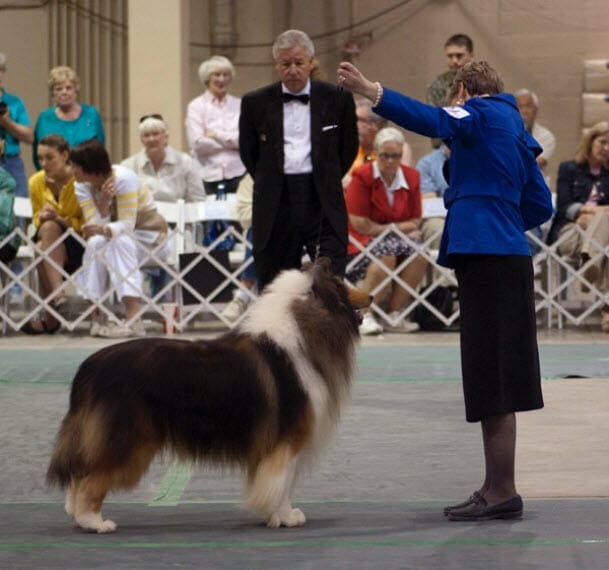
The Collie Club of America’s Constitution states:
SECTION 2: OBJECTIVES. The objectives of this club shall be:
- to encourage the breeding of true-type collies, both Rough and Smooth;
- to join with, and as a member of, The American Kennel Club to define the true and ideal type Collie, both Rough and Smooth, and to promote the perfection of the Collie standard;
- to encourage and foster dog shows, exhibitions and matches under the rules of The American Kennel Club.
Regarding dog shows, or Conformation, the American Kennel Club states:
“the true purpose of conformation showing is to evaluate breeding stock.”
American Kennel Club
Currently, our breed is struggling to maintain correct Collie type with a noted absence of exceptional specimens. The loss of bloodlines, lack of expert mentoring, increasing breeding regulations, rising costs, and other sociological shifts are contributing factors making breed preservation more challenging. However, there is another contributor to the decline of the modern Collie that rarely gets mentioned. That is the Collie specialty clubs. More than any individual breeder, handler, judge, or socioeconomic change, specialty clubs have a significant impact on the breed through the judges they select for their shows.
While astute breeders may not be heavily influenced by what wins in the ring, there is no question the specialty ring has an undeniable impact on the direction of the breed – being that the AKC’s true purpose for dog shows is to evaluate breeding stock. The old stock car racing adage rings true, “What wins on Sunday, sells on Monday.” The club’s goal should be for its shows’ winners to be the best dogs in the competition. In keeping with the CCA’s and AKC’s purpose-driven statements, the selection of capable judges is critical if specialty clubs are to fulfill their duty to the breed.
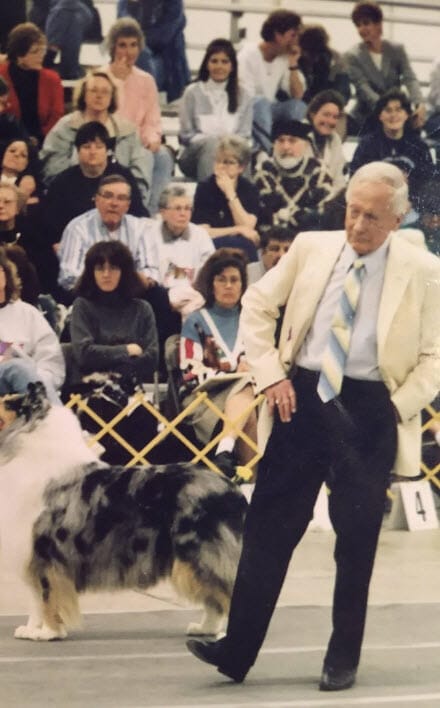
“Respected and Sought-After” Judges
What defines a good Collie judge? Judie Evans, distinguished breeder-judge of Clarion fame, provided an eloquent answer to that question. Her statement originally appeared in the 2003 Collie Expressions article “A Breeder’s Perspective on Judging the Collie.” The Collie Club of America’s Judges Education curriculum has provided the article as a resource for new judges, and it appears on the Collie Club of America’s website. Mrs. Evans’ statement is as accurate today as it was nearly 20 years ago:
What separates those judges respected and sought-after by longtime breeders …? The answer is knowledge and understanding of those virtues that the Standard emphasizes, and the ability to recognize and reward that quality over those superficial characteristics that are far easier to attain. – Judie Evans
Within the Collie breeder-judge circle, there is a wide range of abilities to recognize and reward quality. The greatest judges are individuals who have dedicated their lives to breed study, and they have developed a clear mental image of the perfect Collie. They possess a keen eye for beauty, balance, virtue, and detail. It extends beyond recognition, though, to their demonstrated ability to reward that quality in the ring. Clubs should be striving to hire the respected and sought-after judges Judie Evans described.
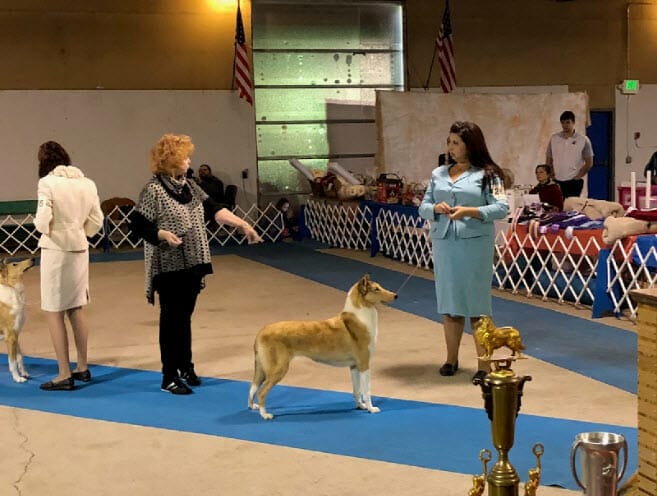
Judge Qualifications Criteria
We regularly consult with clubs who ask for judge recommendations. We’ve also sat through numerous club meetings listening as prospective judges get debated. Invariably, the top criterion for judges is, “Will they draw a large entry?” Realize, however, that question is misguided. It is a biased discussion based solely on the perspectives of those having it. Every judge, regardless of ability, has a small group of ardent supporters, a small group of detractors, while most of the fancy sits somewhere in the middle. Where the club members fall on that continuum determines the consensus. Provided that judges haven’t had an assignment in the area in the previous year, the reality is that judge selection has a minimal effect on entry size. Most Collie fanciers are passionate about showing and they will enter their regional specialties regardless of the judges. The professional handlers depend on handling income and generally attend the same shows every year regardless of the panels. While the dogs they enter may vary by judge, they will be entered. What is impacted by judge selection is the quality of the winners.
Invariably, the top criterion for judges is, “Will they draw a large entry?” Realize, however, that question is misguided.
Instead, the proper question about prospective judges should be, “Will they draw a quality entry?” That should be the paramount goal. The best judges will attract the best dogs in a region – and beyond. Serious Collie breeders review the specialties across the country and don’t put it past them to consider a distant show with a stellar panel. We’ve often driven past the exit to the local specialties to travel cross-country to shows with respected judges. It is an honor for a club when their judging panel attracts entries from different parts of the country – particularly when a Top 10 special (Hawkins System) flies in to compete. What better way to expose local members to the best dogs in the country? Those clubs should be rewarded for a job well done.
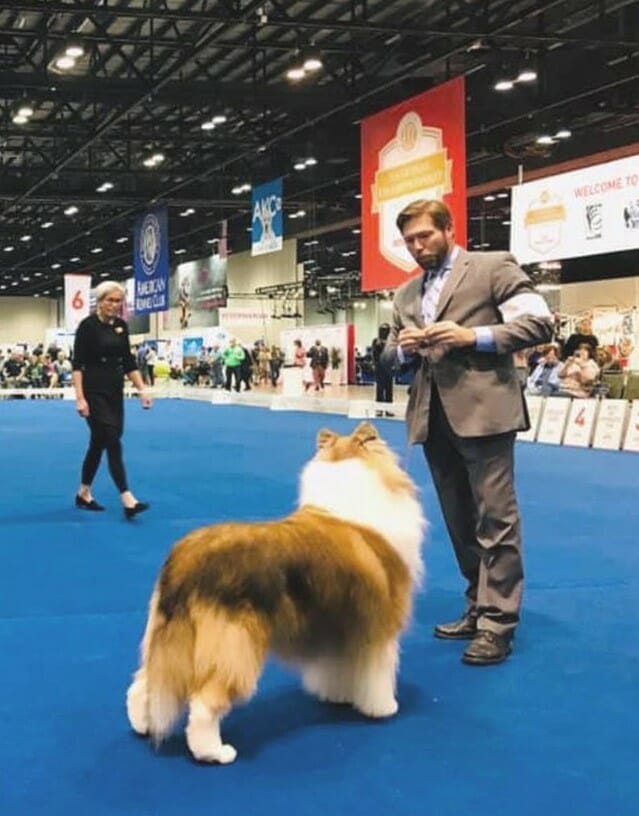
Another unstated, but often present criteria in some members’ minds in the selection process is, “Can my dog win under that judge?” That is a self-serving motive that harms the breed. When that type of thinking prevails in a club, the ones selected typically are judges who put up the general median breed type, or ones who “spread it around.” Or, more recently, those who are Facebook “friends” with large numbers of fanciers. Personal promotion on social media should never be a substitute for the ability to recognize and reward quality.
Personal promotion on social media should never be a substitute for the ability to recognize and reward quality.
Most disappointing is to hear the names of great Collie judges denigrated as being “political.” We have found this to be an all too common occurrence and often the reason the finer breeder-judges aren’t hired. In most cases, that statement couldn’t be more false. These judges approach every assignment with the keenest eye and the sincere hope that something exceptional will walk in their ring. They see things in their entry that other judges miss or are incapable of recognizing. Invariably, the most knowledgeable exhibitors and handlers understand what these judges are looking for and work to bring them what they seek. Some will even hold back their best class entries, waiting to show them to those respected judges. As these judges are seeking greatness, who is on the other end of the lead is immaterial. To assert these judges are political when they simply possess a higher level of knowledge is a disservice to the breed.
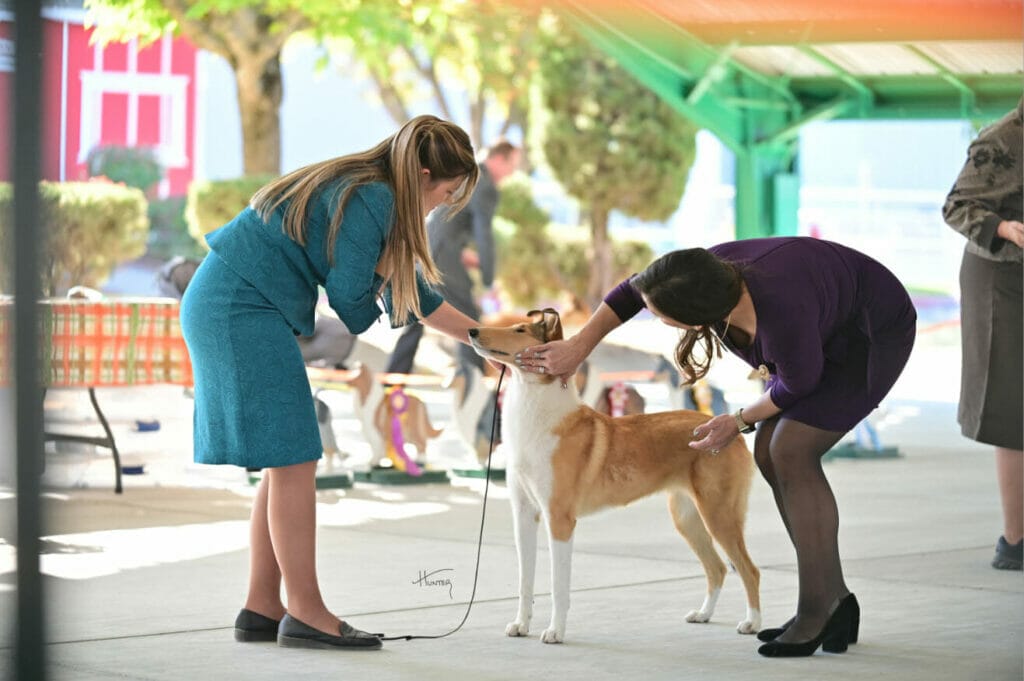
Indeed, in every human vocation, there are political tendencies in many individuals. But, understand that “being political” is a condition that predominantly affects those lacking self-confidence and is not correlated to knowledge or experience. In the ring, most political decisions are made by unsure or under-qualified judges trying to garner respect. Realize that some judges apply for their license to gain the respect they couldn’t earn as breeders. A great judge’s singular motivation is to find and recognize the best dogs. When the word “political” is applied to judges, it is important to include those most susceptible to it affecting their decisions.
Realize that some judges apply for their license to gain the respect they couldn’t earn as breeders.
Mrs. Evans’ statement addresses this topic. Her standard goes beyond only the judges’ ability to recognize quality but then necessitates demonstrating the ability to reward it. That statement directly excludes political judges from the “quality, sought-after judges” group.
There is a tendency in the modern breed where once a new breeder-judge becomes approved, their name gets slotted into the regular judge rotation, creating panels of “merry-go-round” names. Regardless of their ability, most judges get assignments at a similar frequency. This cyclical pattern of judges needs careful consideration. The breed would benefit from the finest judges adjudicating the most assignments each year. The quality of the winners would improve, as would the direction of our breed.
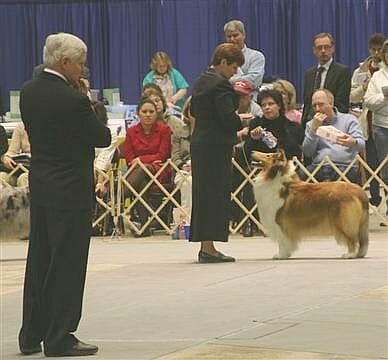
Specialty Club Economics
Inevitably, some may claim this responsibility to hire quality judges could strain club economics. Certainly, economics is important. A club will not survive if it continually loses money. However, hiring good judges and drawing large entries are not mutually exclusive. One does not preclude the other.
To succeed, organizations in any industry must be willing to adjust as conditions dictate. Continuing with “business-as-usual” may spell the end for static specialty clubs. The landscape in purebred dogs is changing. Entries sizes are no longer what they used to be. It is short-sighted for modern clubs to look to conformation entries as a primary revenue source. There are fewer breeders and conformation exhibitors, but there are more performance fanciers. Progressive clubs are adapting by expanding their event offerings to include breed or herding group agility, rally, and obedience competition with great success. Additional revenue drivers such as silent auctions, 50/50 raffles, after-show dinners, and mini-seminars do a terrific job of subsidizing event income. There are specialty clubs that now have coffers sitting at record levels due to their proactive growth initiatives. But it requires doing things differently than what was done in the past. Explore new events and club offerings – and, it may require a facility change. Recruit breed enthusiasts from other performance rings to strengthen club membership, increase revenue, and provide new event volunteers. You never know, a few of those new performance members could turn into tomorrow’s breeders. Specialty clubs’ best days can be ahead of them.
Members need to remain cognizant that breed clubs are not “for-profit” organizations. Profit maximization shouldn’t be the primary goal. Their purpose is to support the CCA’s Objectives and the preservation of the breed. The best way to fulfill that mission is by hiring quality judges.
When finances are a concern, the hiring of a promising provisional judge or a respected local breeder-judge are viable options. Provisional judges generally pull strong entry numbers as exhibitors are interested to see how they will perform. However, the capability expectations of these judges should be similar to licensed judges. Qualified provisional judges must be those with deep breed knowledge or who have demonstrated mastery in breeding or handling quality Collies. The American Kennel Club’s Collie breed license requirements are insufficient to indicate a judge’s ability to recognize and reward true breed virtues. Hiring a new judge simply because they are provisional is a failure by the club to uphold its responsibility to the breed.
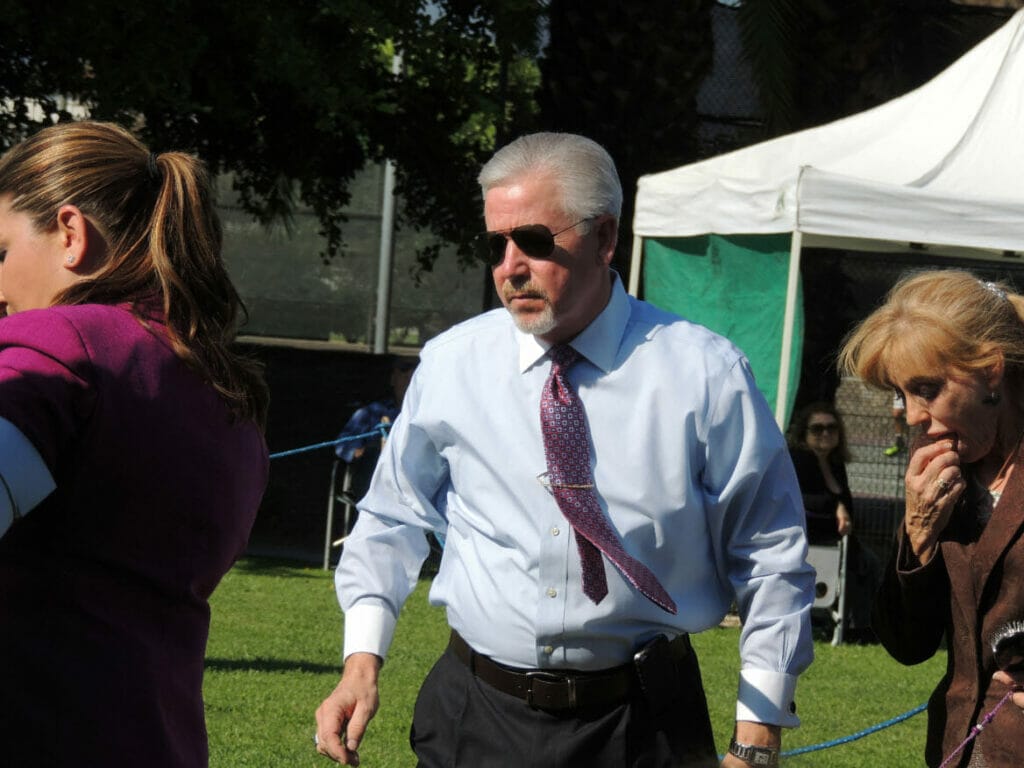
Using a respected local Collie breeder-judge is another option to save on travel and accommodation expenses. But again, the hiring criteria for ability remains. Realize, also, that hiring local judges can negatively impact entries due to the inevitable familiarity between the judge, exhibitors, and their dogs.
The American Kennel Club’s Collie breed license requirements are insufficient to indicate a judge’s ability to recognize and reward true breed virtues.
In fairness to clubs, new factors exist that make hiring judges more difficult. Over the past decade, the compaction and compounding of the Collie specialty calendar into the late-January to early-March show season reduces judge availability. Opportunistic clubs are securing judges further into the future, forcing other clubs to look farther down their list for judges without conflicting assignments. Many specialty clusters now compete for entries and judges. Each year, however, there are several quality Collie judges who don’t receive a single assignment, while the more popular Facebook names are racking up frequent flyer miles. With more than 100 licensed Collie breeder-judges, there are quality names available to be found if due diligence is performed.
A frequently untapped source of competent specialty judges are our friends in the Shetland Sheepdog breed. There are over 25 Sheltie breeder-judges who hold their Collie license. A handful of them have proven very adept at finding the best Collies in an entry. Perform some research and consider one of the more capable Shelties judges. Beyond the Shetland Sheepdog breed, however, non-Collie breeder-judges should not be considered for a specialty assignment except in an emergency situation.

Judge Selection Process
How should modern-day clubs be selecting judges? The first question a club should ask about a prospective judge is, “Can the person attract, recognize, and reward the finest Collies?” If the answer is “No,” it is the club’s responsibility to remove the name from consideration. The speculative questions of How much will travel expenses cost? Will they draw a large entry? or, Will handler so-and-so enter? should be secondary.
The first question a club should ask about a prospective judge is, ‘Can the person attract, recognize, and reward the finest Collies?’
Many specialty clubs need to review and revise their selection process. Most judges are selected through a nomination and voting process. When club memberships were comprised of several experienced breeders, a democratic process was sufficient. However, as the composition of club membership has changed to include less experienced breeders, more novice fanciers, more performance enthusiasts, and even pet owners, there is a lack of the necessary collective knowledge to select the quality judges. Recently, we’ve heard club leaders apologetically explain their club’s judging panels by saying “We didn’t have enough votes to outnumber the performance members.” That is unacceptable and undermines the primary purpose of the club. In those cases, a judges committee is typically the best way to ensure a quality panel. Choose a small group of experienced, objectively-minded individuals to select quality judges. The year’s most important task requires the club’s most knowledgeable members.
If a club lacks the necessary knowledge to select quality judges, it should reach outside the membership. Ask breed experts for their list of respected judges. Inform them that the club desires to choose judges who will attract, find, and reward the best Collies. That request will garner a solid list.
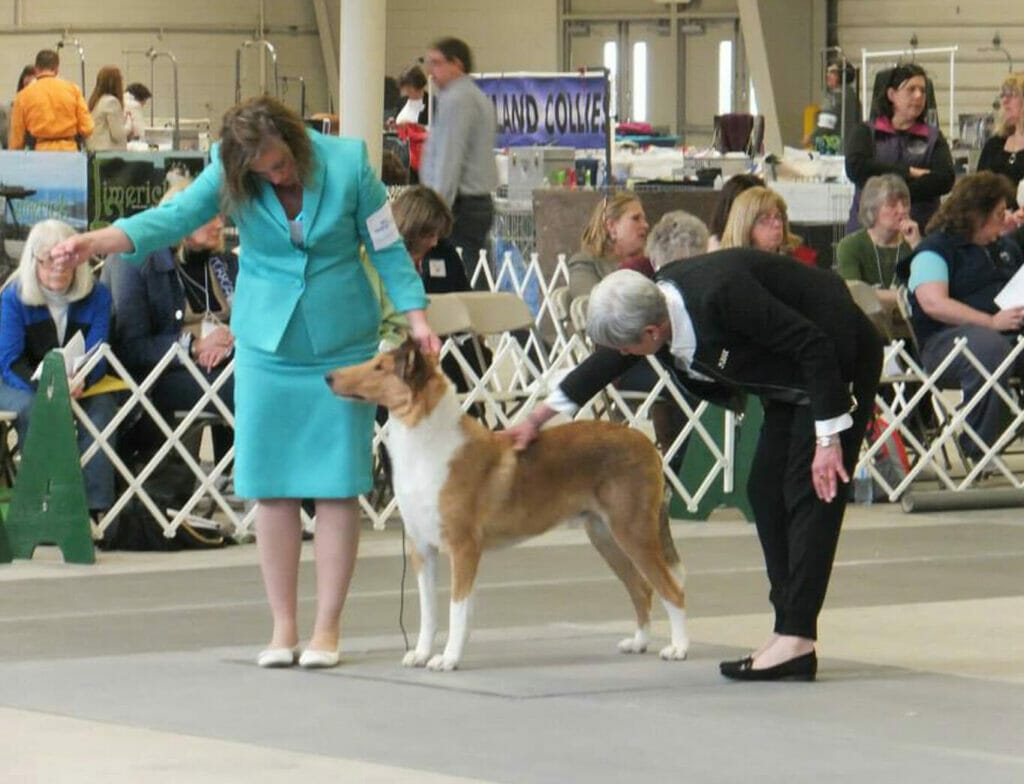
Final Thoughts
Several Collie clubs have earned reputations for consistently assembling panels with respected judges. In particular, Collie Club of New England, Chesapeake Collie Club, Hunterdon Hills Collie Club, and Collie Club of Washington have done admirable job over many years. Wins at these shows are particularly esteemed and noteworthy. Applaud these clubs for the duty they uphold. Other specialty clubs should strive to earn a similar reputation.
May this serve as an admonition to Collie specialty clubs. As guardians of our breed, they must be committed to the pursuit of “true-type Collies” and “the perfection of the Collie Standard,” as stated in the Collie Club of America’s Constitution. Their judge selections are the most significant thing they can do to fulfill their responsibility to the breed and positively impact its future. May we all remain focused on the pursuit of excellence in the preservation and advancement of our Collie.